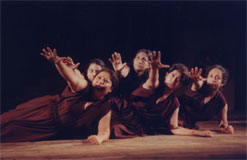| |
| Press
Clippings |
| House of Desires - THE INDIAN EXPRESS, WEDNESDAY, 24th
January, 2007 |
A Federico Garcia Lorca masterpiece is relived —
and evocatively—in a Bengali stage adaptation. It's
obvious that Lorca's concerns still remain relevant
 FEDERICO Garcia Lorca's story of suppressed passions, madness, jealousy and deceit couldn't have been relived with more diligence than how it was at the Academy of Fine Arts on Monday. Theatron's presentation of the Bengali adaptation of Lorca's classic, The House of Bemarda Alba made sure that the play not only brought alive the intricate social web of South American life on stage, but also did so with more than a passing nod to the genius of the Spanish poet and dramatist. FEDERICO Garcia Lorca's story of suppressed passions, madness, jealousy and deceit couldn't have been relived with more diligence than how it was at the Academy of Fine Arts on Monday. Theatron's presentation of the Bengali adaptation of Lorca's classic, The House of Bemarda Alba made sure that the play not only brought alive the intricate social web of South American life on stage, but also did so with more than a passing nod to the genius of the Spanish poet and dramatist.
It becomes apparent that the adaptation emerged out of a long relationship when Saswati Biswas, its director, says that Lorca's play was something she grew up with. "So when I set out to direct a new production this was one of the first plays to crop up," she adds.
Set in the oppressive environs of Andu-lasia, Lorca's play documents the unrelieved oppression of five unmarried daughters by their newly widowed mother, Bemarda Alba, and their seething frustration, sexual and otherwise. Biswas's faithful production, titled Bernardo Albar Bari, ably brings out the stifling aridity of conservative Spanish Catholicism at its worst.
It would have been easy to term this all-woman ensemble play as a strong statement in feminism, but the director refuses to do so. "The play is primarily about oppression. And oppression has only the language of force. The play is a powerful cry for freedom under repressive conditions. The issues of class and gender within the household follow that primary theme."
With a wonderful cast of strong performers who more than do justice to their respective roles Biswas couldn't have gone wrong. Says actor Chaiti Choudhury who makes for a formidable Bemarda: "I had a wonderful time living my role, and the fact that my fellow actors were so professional and talented, egged me on." Trina Nileena Banerjee, who plays her rebellious young daughter Adela, agrees. "We have a great cast here. I have been into theatre since a very young age and it is great to be with people I have grown up performing with," says Banerjee.
Lurking in the background of the play's carefully created world is Lorca's own agenda—the rise of Franco's Spain, and the worsening of the European situation in general. Biswas makes no attempt to adapt it to match contemporary situations or standards. 'A tale of oppression doesn't need to be made contemporary to be relevant. The theme itself is universal and timeless," she reasons.
If the audience reaction, where some were even moved to tears, was anything to go Lorca has once again managed to touch a fundamental core of human existence.
|
| - PREMANKUR BISWAS |
|





